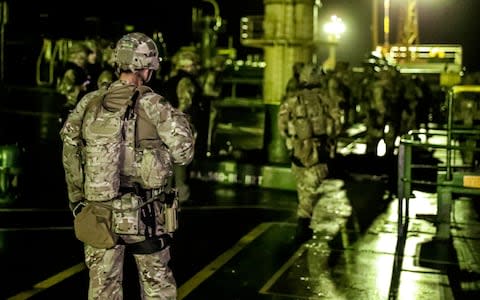Soldiers half as likely as general public to suffer mental disorders, but too often treated as 'wounded warriors'

Soldiers are half as likely as the general public to suffer with a mental health condition, new figures show.
The latest annual report on mental health in the Armed Forces showed on average that 2.7 per cent of service personnel assessed at specialist MoD Mental Health Services had a mental disorder. This compares with 4.4 per cent of the wider British population that accessed secondary mental health services in 2017/18.
Royal Marines had the lowest figure at 2.2 per cent, with the RAF highest at 3 per cent. The Royal Navy and Army were in between with 2.5 and 2.7 per cent respectively.
Glenn Houghton, the UK’s Senior Enlisted Adviser to the Chiefs of Staff Committee said: “times are changing” and praised the “fantastic work” of the military psychiatric services.
He urged all members of the military to “continue to break down the stigma and barriers towards [mental health] care”.

However, experts have said veterans can struggle to find employment in civilian life because of a perception that they will have mental health challenges at some point.
Veterans' executive experience from young ages makes them "people of real value" to the workforce, rather than "wounded warriors", according to Elisabeth Braw, a leading Defence analyst.
Ms Braw, of the Royal United Services Institute, believes the paucity of first-hand military experience in wider society, or the lack of a close family member in the forces, makes it more likely for the population at large to see the role of veterans “to be on a pedestal as a wounded victim”.
Speaking to the Telegraph she said: “That’s the impression you get from only watching war movies instead of actually interacting with soldiers.
“Employers have very little understanding about the skills these people bring, including that they have a lot of executive experience at a much earlier age than the rest of us.
“People think of them as wounded warriors instead of people who have specific expertise in an area that is relevant to the company. They become almost symbols of something as opposed to people of real value to the company because of the expertise they have.”

The MoD report accepts that comparisons with the UK general population are difficult for a number of reasons. Due to the nature of military service, in particular access to weapons, a patient’s medical officer may refer at an earlier stage to specialised mental health services compared to the UK general population.
In addition, the source of the UK general population statistic for mental ill health also covers services such as Adult Learning Disability, Autistic Spectrum and Children/ Young People services which are not relevant to the armed forces.
The lower rates seen among military personnel may be due to the structure within the military. Studies have shown that tight unit cohesion plays a vital role in maintaining good mental health as well as helping to identify early signs of mental ill-health.
The rigorous selection of individuals into the military may also help to prevent those with more serious mental disorders joining up.
However, the report also acknowledges that personnel with serious mental disorders may be considered for medical discharge, meaning more severe cases of mental health requiring in-patient admission may not remain in the Armed Forces population, which may impact the figures slightly.
Former Paratrooper turned cyber security expert Steve Maguire said the positive public sentiment of the military increased as a result of the wars in Iraq and Afghanistan, but “more so in benevolence”.
“Society says ‘look at these poor guys and girls with PTSD or with their legs blown off, they’re heroes’, but it doesn’t go on to say ‘we could get a lot of benefit by employing these people’.
“A lot of ex-military get put on a pedestal but not one they want to be on, because they feel they can still add a lot to society; they almost become has-beens.
“It’s like [veterans] only become remembered for what they were, not what they may become in the future. That’s not part of the hero story, is it?”


